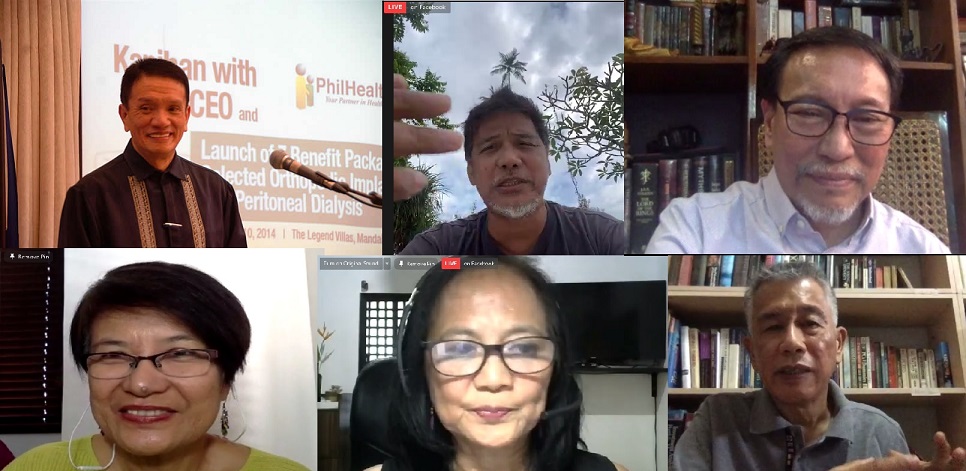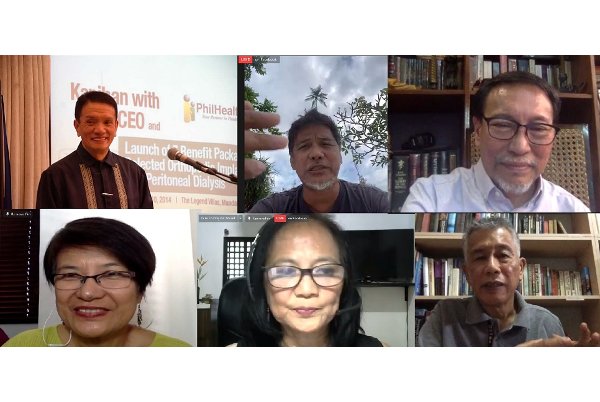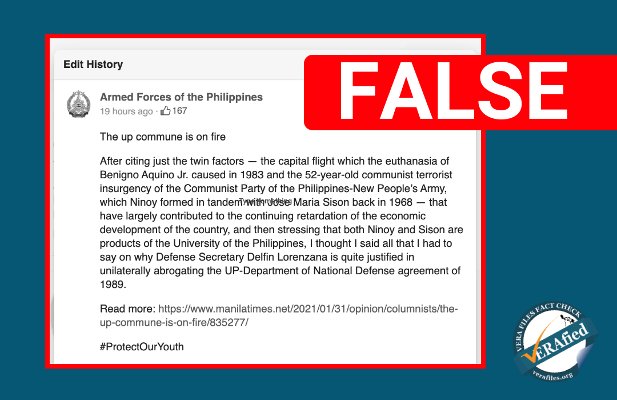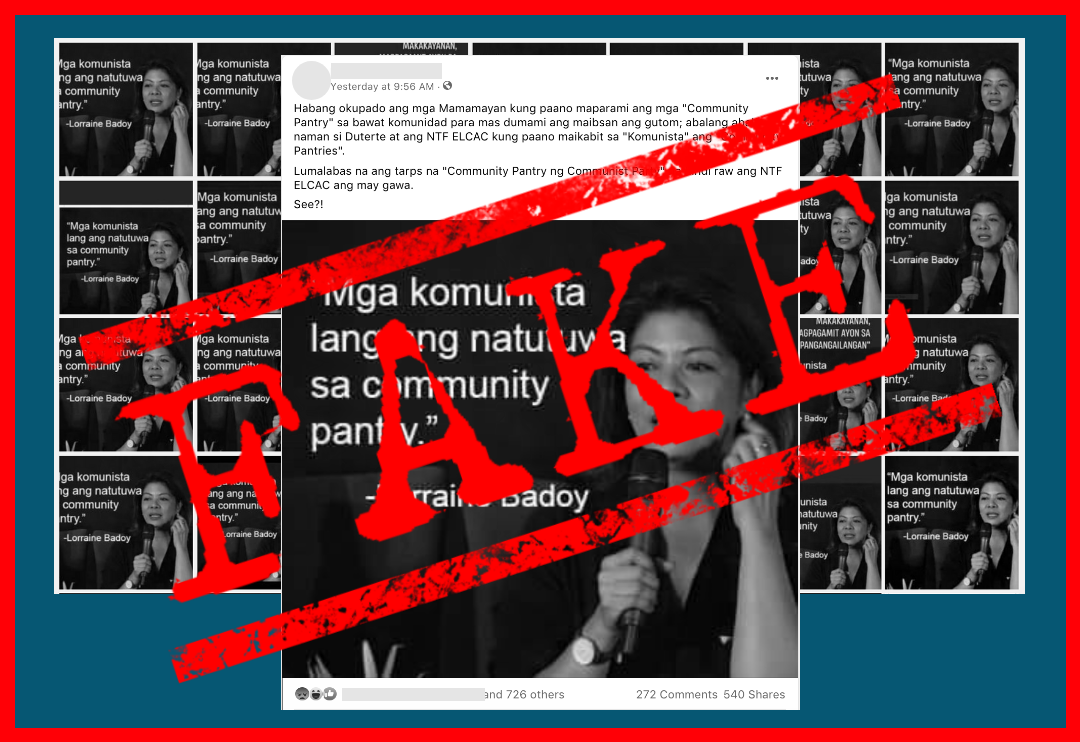
University of the Philippines alumni who were red-tagged by the Armed Forces of the Philippines in an online presscon, “Mga (alleged) NPA ng UP” on Saturday. From top left clockwise: lawyer Alexander “Alex” Padilla, former DENR executive Elmer Mercado, lawyer Raffy Aquino, business journalist Roel Landingin, Institute for Social Entrepreneurship in Asia President Marie Liza Dacanay, and playwright Liza Magtoto.
Six of the University of the Philippines (UP) alumni who were tagged in the military’s social media posts as members of the New People’s Army (NPA) are mulling to file cyber libel and contempt charges against Armed Forces and defense officials over the red-tagging brouhaha
Lawyers Alex Padilla and Raffy Aquino, business journalist Roel Landingin, playwright Liza Magtoto, development worker Marie Lisa Dacanay, and former journalist and government official Elmer Mercado appeared in an online press conference on Saturday, Jan. 23, denying the allegation and denouncing the inclusion of their names on the list.
In a Jan. 22 post on the Facebook page of the AFP Information Exchange, 28 names including an alias “Gary” were listed as “some of the UP students who became NPA (died or captured).” The post had since been deleted but had been shared on multiple military-linked Facebook pages and by netizens.
During the virtual conference, all six UP alumni declared that they were obviously not dead nor were they captured during military operations. While admitting that they joined protest rallies during their time in the University in the 1970s to the early 80s, and even after, they said they have never joined the NPA, the communist movement’s military arm.
“We want to hold people accountable for the malicious inclusion of our names on the list,” said Aquino, an active member of the Free Legal Assistance Group (FLAG).
“The members of the group are consulting and definitely we want (to hold) people accountable for the reckless publication and malicious implication,” echoed Padilla, who chaired the government panel in the peace talks with the NPA-NDF during the Aquino administration.
The group noted that the red-tagging came out after the Department of National Defense (DND) unilaterally terminated the 1989 agreement with the University of the Philippines (UP), which prevented state forces from entering and conducting operations inside its campuses without prior notification.
Defense Secretary Delfin Lorenzana, in a letter dated Jan. 15, informed UP president Danilo Concepcion of the termination, saying the department “finds [the agreement] as a hindrance in providing effective security, safety and welfare of the students, faculty, and employees of UP.”
The secretary also said “recent events undeniably show” that a number of UP students have been identified as members of the Communist Party of the Philippines – New People’s Army (CPP-NPA).
He added, without providing any evidence, that the DND is “aware that there is indeed an ongoing clandestine recruitment inside UP campuses nationwide for the membership in the CPP-NPA,” and that the agreement was “being used” by recruiters and supporters “as a shield” against law enforcers.
Padilla said the abrogation of the DND-UP agreement was just a “front act” for a bigger campaign not only against the UP community but also against society. He said the military’s red-tagging “goes beyond psy-ops (psychological operations)” but a “crackdown on dissent, which will overflow to the rest of the society.”
“It’s all orchestrated and it’s not going to be a restful year, aside from the COVID (coronavirus disease) still there,” he said.
Asked up to what extent the accountability should go, Padilla said “it’s not only the AFP,” noting that Lorenzana, being the alter ego of President Rodrigo Duterte, is assumed to just be following orders from his commander in chief.
“This is sloppy. This is dangerous. Above all, I am afraid for all those they have red tagged,” added Padilla, who had once served as undersecretary of the Department of Health and president and chief executive officer of the Philippine Health Insurance Corp. (PhilHealth).
Further, Padilla said the red-tagging was a veiled attempt to cover-up the Duterte administration’s incompetence in responding to the COVID-19 pandemic, and to go after those who petitioned the Supreme Court to nullify the Anti-Terrorism Act of 2020.
“I think meron ding angulo ng contempt (there is also an angle of contempt) with regards to the inclusion on the list of the counsel on the ongoing litigation in the Supreme Court on the Anti-Terrorism Act,” he added.
“It’s concerning because it’s the type of info they use for military operations. Imagine if nag-reunion tayo (we hold a reunion) and they misconstrued it as an NPA assembly and pwedeng maging subject ng military operation (it could be subjected to a military operation), Landingin said.
Questioning the credibility of the list, Magtoto cited the inclusion of the name of actor, director Behn Cervantes who died of natural causes in 2013. “Will the military take credit for his death? ” she asked.
Dacanay said she was “more fearful for others” who may also be red-tagged but are not as “well-placed” as they are and don’t have access to the media. For them, she said, the military’s actions to stifle dissent must be nipped in the bud.
In a statement, the National Union of Journalists in the Philippines condemned the accusations against those red-tagged and noted its possible implications on them.
“That these units shared this post means they believe in the truth of the accusations. Would it be farfetched to worry that they might go from sharing the accusations to actually taking action against those so accused?” the NUJP statement said.
UP officials speak up
In the same virtual conference, UP Diliman Chancellor Fidel Nemenzo explained that the recent red-ragging of its alumni is an assault on academic freedom.
“The presence of the military (inside the UP campus) creates a chilling effect. We owe our success to the atmosphere of academic freedom,” Nemenzo said.
In a statement, UP president Danilo Concepcion said the allegations pose “a very real danger to the lives and safety of our students, faculty, staff and the members of the UP community.”
“These dangers come not only from elements of the military and the police, but also from vigilantes who seek to take justice into their own hands,” Concepcion said.
He vowed that UP will continue to defend the university from attacks against academic freedom even if they continue work with AFP and the Philippine National Police.
What’s wrong with being Red?
Meanwhile, Mercado, a former political reporter for Ang Pahayagang Malaya, explained that there’s nothing wrong with being “red” if it means being articulate and critical.
“If red means being articulate in your ideas, presenting analysis based on objective reality and understanding of the facts, and articulating it in the best of your ability and doing something with it, what’s wrong with that? Why is that something that a small clique of the military says is bad?” asked Mercado, who also served as undersecretary at the Department of Environment and Natural Resources (DENR) during the Estrada administration.
“If we help the people alleviate poverty, hindi ba iyon din po ang trabaho nila (isn’t it their job too)? So kung iyon ginagawa namin at ginagawa din nila, ‘di ba dapat tawagin din natin sila na NPA (If that’s what we do which they also do, shouldn’t we also call them as NPA)?” he quipped.
Magtoto urged everyone, not only those who were red-tagged to be “continuously vigilant.” At the same time, she said, “ We shall continue creating.”
Congressional action eyed
Lawyer Jay Batongbacal, a professor at the UP College of Law, said Congress may step in to institutionalize the DND-UP accord that Lorenzana had abrogated. Lawyer Theodore Te, also a UP law professor and former spokesperson of the Supreme Court, noted that one bill had already been filed at the House of Representatives, and two resolutions condemning the abrogation of the agreement have been in the House and in the Senate.
“If Congress comes in, it might be a more effective route, if they legislate quickly,” Te said, noting that several senators and congressmen are UP alumni who would stand with the community on the issue. The legislation, he clarified, would not cover UP alone, but also other state and even private universities.




